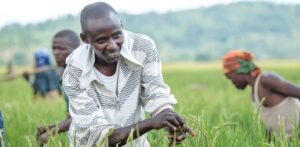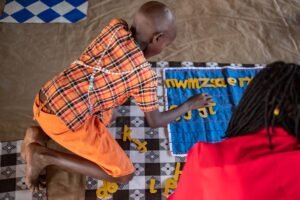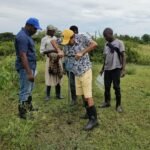By Rogers Aghan, April, 3, 2023, High-impact micro-irrigation technology is making a significant difference in the lives of women farmers in the Kigoma region of Tanzania.
The Kigoma Joint Program (KJP) has allowed the Norwegian Church Aid (NCA) to implement a permaculture initiative in Kigoma. This initiative builds on youth and women’s economic empowerment and inclusive Digital Economies (IDE).
The program has allowed women farmers to access essential financial and non-financial services through innovative and affordable approaches.
Micro-investment opportunities have been successful thus helping farmers access resources and tools necessary to increase productivity and boost their businesses.
A good example is Hiari Youth Group, which is a saving and loan group in Kigoma with seven members with women constituting the majority.
The goal of the group at its inception was to accumulate savings to purchase agricultural inputs during the staple crop planting season. Albeit, with NCA guidelines the group settled for horticulture production.
The investment assured high and quick returns which would help accumulate more funds. They kicked off by growing vegetables which saw increased production due to the ready market hence facilitating the nutritional quality of the domestic food basket.
Interestingly, simple drip irrigation technology, helped the group generate a profit of slightly more than 2 million Tanzanian shillings in a period of six months. They have expanded from four initial garden beds to over twenty, where tomatoes, Chinese cabbage, and cucumbers are also grown.
Members have each at least two beds at their households, and they all share a vegetable garden. They have currently been able to use revenue earned to purchase six acres of land for cereal crops including maize.
“We are now certain that our growth can allow us to purchase high-quality agricultural inputs with the much in our saving wallet.” States Nengarivo Losai, a member of the Kibondo-based Hiari Youth Group.
The success is extensively due to the micro-irrigation kit that the group invested in. This kit constituted quality inputs and horticultural/agronomic support. Some of which is delivered digitally through an application created by Esoko, to ensure farmers have the tools they need to grow their crops successfully.
The micro-tech kit is a low-tech solution that is easy to maintain and use. It is developed and designed to be accessible and affordable to farmers in rural areas, where access to water can be scarce.
The kit includes a drip-irrigation system, which delivers water directly to the roots of the crop. This helps to conserve water and ensure plants receive only the right amount of water they require to grow and thrive.
The project has up until now impacted 4,275 micro-investors in 115 savings and loan groups, making a vast difference in the lives of farmers, and particularly women farmers in the region.
By providing them with the tools they need to grow their business in a traditionally female-dominated value chain, these farmers are able to increase their income and support their families.
The success of the Hiari group is just one example of how this technology, facilitated through the Kigoma Joint Programme with support from UNCDF IDE, is making a difference in the lives of women farmers in the region.







